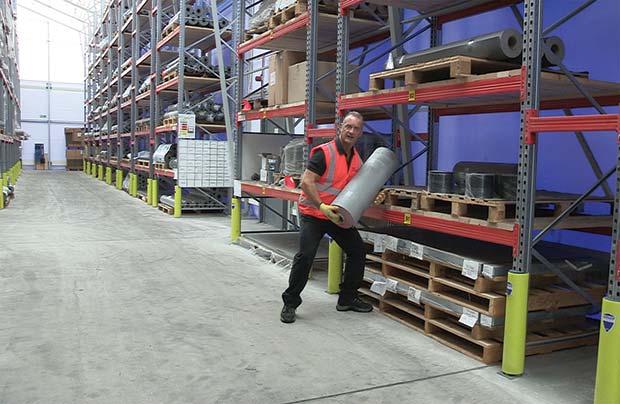Despite legislation and better risk management, Musculoskeletal Disorders (MSDs) remain one of the most frequent types of work-related injury across most industry sectors.

Even where handling is significantly reduced, it’s rarely eliminated altogether and people still get injured.
Why? Because conventional methods of addressing that residual risk simply aren’t effective.
However, Pristine Condition Ltd has continually bucked that trend and its founder, Davy Snowdon, explains how organisations can get it right.
“Reducing handling injuries is quite simply about changing people’s habits; exchanging a bad one for a good one.
This has 3 components:
• Individuals’ buy-in to the change
• Monitoring take-up of the change
• Management support to maintain the change
The harsh reality is that initiatives fail when any of those three is deficient.
When it comes to manual handling training though, conventional wisdom overlooks one simple fact;
The body doesn’t tell you every time you get it wrong, only when you’ve got it wrong too often; and then it’s too late.
Consider the most extreme manual handling tasks you’ll come across; Olympic Weightlifting.
Injury is a huge fear for any athlete and weightlifters are no exception, yet even when they fail a lift, they don’t get injured. Why?
Olympic Weightlifting has evolved, with athletes striving for anatomical technical perfection, minimising the pressure they place on their body. Result? Even though they’re moving weights far beyond so-called “safe” guidelines, weightlifters are rarely injured trying.
![photo-(24)[5]](https://warehousenews.co.uk/wp-content/uploads/2015/02/photo-245.jpg) It proves that avoiding injury is not primarily about weight, but about technique.
It proves that avoiding injury is not primarily about weight, but about technique.
Conversely, conventional manual handling training is too generic, using unrealistic scenarios of lifting empty cardboard boxes from perfectly flat floors onto precisely positioned, waist-high tables.
Your employees’ workplace isn’t like that, so don’t be surprised when they don’t buy into that message.
Faced with patronising techniques which don’t work in their real world, employees quickly revert to old habits.
Worse still, they emotionally disengage from the whole process, so their belief now is “you can’t do it like that where I work”, which then goes unchallenged.
To get employee buy-in, you need to deliver practical training, using realistic lifting principles that individuals buy into because they genuinely believe will work, are easy to follow and apply to every scenario they face.
Crucially though, training needs to be delivered in an engaging, positive way. When was the last time you were energised with a “Death by PowerPoint” presentation? So don’t be surprised when boring training delivers poor results.
Only by embracing those two fundamentals; realistic principles, delivered in an engaging way, will your training stand a chance of succeeding.
So how do you sustain that behaviour change?
Challenging poor manual handling technique rarely happens. Why?
Walk into most warehouses without High Visibility PPE and you’ll quickly be challenged by someone off the shop floor about your behaviour.
Why? Because the company has made it abundantly clear what is right and what is wrong. Staff understand the difference and with that understanding comes the confidence to challenge.
But with poor handling technique, supervisors don’t know what “right” is, even if they instinctively know something is wrong.
So they don’t have the knowledge to correct poor technique, or then, the confidence to challenge that behaviour.
Result? Poor behaviour prevails.
So not only do you need to train the workforce, you also need to train front line managers how to spot and rectify incorrect technique.
Simplicity is the watchword again here – as simple as spotting a PPE violation.
![PristineLogoBlack[5]](https://warehousenews.co.uk/wp-content/uploads/2015/02/PristineLogoBlack5-190x74.jpg) Your Lifting Principles not only need to be simple, they also need to be binary; either right or wrong, with no grey areas and you need an auditing mechanism which deals with both.
Your Lifting Principles not only need to be simple, they also need to be binary; either right or wrong, with no grey areas and you need an auditing mechanism which deals with both.
The trick though is giving the supervisor the skills to deal with either scenario effectively. Get this part right and you’ll see some amazing results because the training is now being properly sustained through effective supervisory auditing.
Combine that with an easy mechanism for recording the audit’s findings and you’ve got the makings of a management tool that quickly shows where more effort can pay dividends, improving results even further.
Then check those audits with your own observations and be sceptical on any that suggest 100% compliance!
Finally, support managers to maintain momentum and deal with the scenarios you hadn’t planned for.
There will always be new ways of doing things, new plant and new processes, new equipment and new tools, so your handling techniques need to adapt to that change.
Think about how you’ll address the things that aren’t an issue today but might be tomorrow, how you’ll stay abreast of latest technological best practice affecting your industry, accident trends and their avoidance, the civil scene and what’s happening with personal injury claims trends.
Think about how to keep the programme’s momentum going and look for ways that you can redeliver similar messages differently, so people remain energised by it.
Refresher training is a given, but think more creatively about how that’s going to be done without it becoming just another boring “elf n safety” refresher.
Deal with the negatives, but celebrate the positives with everyone because, let’s face it, people like to be associated with something that’s successful.
But if someone does get injured, make sure you include reference to their anatomical technique in the Investigation.
Be prepared to challenge inconsistencies and only ever record facts, not presumptions or opinions.
In Pristine Condition’s experience, there are 3 fundamentals to changing habits and those organisations which consistently achieve all three, will see significant reductions in their manual handling risk profile, in their manual handling accidents and in the total cost to the business from those accidents.
Tel: 01491 414464




Comments are closed.